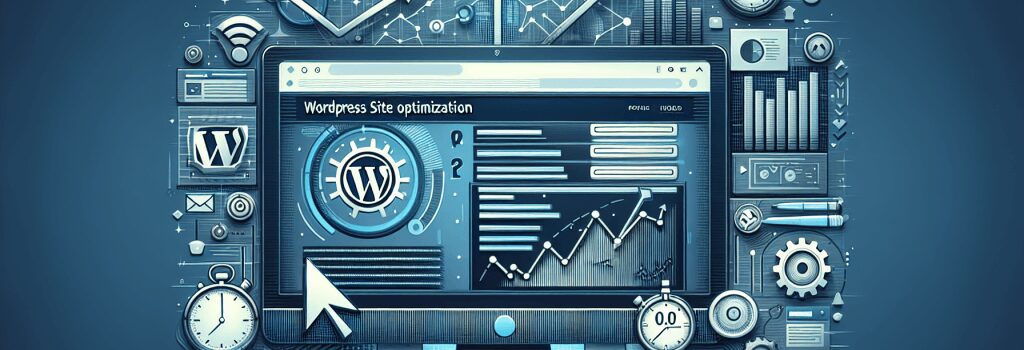WordPress Site Optimization: Speed and Performance Tips

Let’s all agree on one thing- hanging around, waiting for a slow website to finally deign to grace us with its appearance, is about as fun as trying to self-construct IKEA furniture. Does that ring a bell? Yes? With me so far? Good!
So, imagine how your website’s visitors might feel if your web pages are slow as molasses to load. Spoiler alert: they’re probably not going to stick around to find out exactly how long it takes. In the cut-throat world of web-development, where every additional second of loading time can spell disaster, it’s critical to ensure your WordPress site is running as smoothly as a hot knife through butter.
Okay, let’s quit the jibber-jabber and dive right in! So grab your coding hat and hang on.
Tune Into Your Theme
Shakespeare asked, “What’s in a theme?” – oh wait, it was ‘name.’ Never mind, the concept still holds. The ‘theme,’ or design template of your WordPress website, can be a heavyweight that slams your site into a painfully slow loading time. Now, we’re not saying that all themes are like that snail in the famous race against the hare, but some can be quite hefty with unused code and unnecessary images.Pay attention to the size and structure of your theme. Opt for a clean, lightweight theme that doesn’t carry around excess baggage. Like they say, “Keep it simple, silly!” – Or was it ‘stupid’? Either way…
Optimize Your Images: Worth More Than A Thousand Words
Images on your website are like Inspector Clouseau in a Pink Panther movie— they steal the show. Yet, high-resolution show-stealers can also hog all the bandwidth, leading to longer loading times. What’s more, your SEO score can also take a dive due to this.So, what’s the solution? Compress and optimize your images! Bet you didn’t see that coming. Jokes apart, seriously consider compressing your images. There are several easy-to-use tools available for this. This step can substantively reduce your load times, proving once again that size matters (at least in the world of website loading times)!
Minify CSS and JavaScript Files
Okay, ‘minify’ might sound like we’re trying to make your CSS and JS files teeny-tiny as if they were being zapped by a mad scientist’s shrink ray. Well, we kind of are.Minifying essentially involves reducing the size of your CSS or JS files – getting rid of all redundant data, unnecessary formatting, and unused code. This can have a dramatic impact on the speed of your WordPress site. Trust me, you’ll be zipping along quicker than Road Runner outrunning Wile E. Coyote.
Keep a Clean Database
Just like your room (we won’t tell mom, promise), databases need to be tidied up from time to time. Unnecessary data can overload your WordPress database, leading – you guessed it – to longer loading times. Regular cleaning helps to keep your database light and efficient, primed for optimal performance.By now, you’re hopefully well-armed with tips and tricks to boost your WordPress site’s speed and performance. Remember, dear reader, slow and steady might win the race in storybooks, but in the real world of web development, speed stands tall. Now, go forth and code!
FAQ
What are some common reasons for a slow WordPress site?
Slow hosting, large image file sizes, too many plugins, outdated themes or plugins, and lack of caching are common reasons for a slow WordPress site.
How can I improve my site’s speed?
You can improve site speed by using a lightweight theme, optimizing images, minimizing HTTP requests, utilizing caching plugins, and enabling GZIP compression.
What is caching and why is it important for site performance?
Caching saves a static version of your site to reduce server load and improve load times for returning visitors. It’s crucial for improving site performance.
What steps can I take to optimize images on my WordPress site?
Optimize images by resizing them to the correct dimensions, using compression tools, and choosing the right file format (JPEG or PNG) for faster loading times.
Why is a responsive design important for site performance?
A responsive design ensures that your site looks good and loads quickly on all devices, improving user experience and overall performance.
How can I minimize the number of HTTP requests on my site?
Minimize HTTP requests by combining CSS and JavaScript files, using CSS sprites for images, and utilizing browser caching to reduce the number of requests to the server.
What role do plugins play in site performance?
Plugins can slow down your site if not optimized properly. Limit the number of plugins you use, choose lightweight alternatives, and regularly update them for optimal performance.
What is GZIP compression and how does it improve site speed?
GZIP compression reduces the size of your website files before sending them to the browser, resulting in faster loading times and improved site speed.
How can I leverage browser caching for better performance?
You can enable browser caching by setting expiration dates for files on your server, allowing returning visitors’ browsers to load resources from their local cache instead of re-downloading them.
Why should I regularly update my WordPress site for performance?
Regular updates patch security vulnerabilities, improve compatibility, and optimize performance. Keeping your WordPress site up to date is crucial for speed and overall site health.


